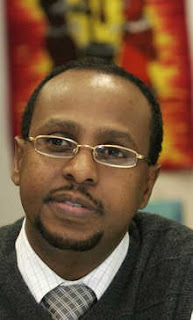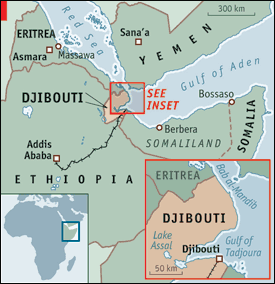
(Magan Ibrahim a senior Somali journalist wrote this article in 1993 right before Somaliland Parliamentary election. At that time, he was the poilitical editor of a leading somali website Hadhwanaagnews.com)
The democratization process of Somaliland is in its infancy. With hardlyany developed resources at hand, Somaliland has produced resultsunmatched by any other country within its geographic region.
Skeptics, of course, may hold a different view. Some observers, -- and especially ones who live inside the country --, may be too close to the trees in order to see the forest.
They may have great difficulty visualizing any specific outcome of the turbulent process that has been unleashed. They may fail to recognize it for what it really is: – a path to democracy.
One can get a better view of this path and see the first steps clearer at a greater distance. One begins to see the stability the peace has delivered over the years by resilience. The question, however, remains: will this delicate process sustain itself?
Certainly, there are so many things that still need to be fixed ordeveloped. The national and local infrastructure is, practically, nonexistent. Many public institutions have not even been conceived yet. The healthcare system is in shambles; public education is minimal; unemployment is high, and urgent actions must be taken to prioritize and manage the meager resources one has.
Corruption among officials is rampant and it must be at least curtailed. Inept politicians, directors, and an over abundance of totally incompetent policy makers have created a desperate situation. A systemic improvement is inconceivable unless this issue is properly resolved.
There are too many other areas in dire need of substantial improvementas well. And, after all that has already been said, one can ask the perfectly legitimate question: Is there a glimmer of hope? Is there a remote chance for a successful resolution of the present dilemma?
What redeeming seed remains there that is worth the effort not to give up? What is it that makes this war-torn region, devastated by famine, diseases and hatred, which resembles more a hell hole than a country, appear sufficiently encouraging for the great powers of the world to take notice?
Specifically, what makes this democracy, in its infant stages, stand out particularly now in view of the new world-order ideology promulgated by the United States’ president which is based on and accentuates the concept of “freedom and democracy to all”?
This change in the American policy toward the Middle East, heralded in the name of liberty, encourages bringing about gradual changes that would lead to eventual replacement of brutal dictatorial regimes.
This new policy may work to Somaliland’s advantage as well by setting an example not merely for the affluent Middle Eastern countries.
This freedom and the road to democracy is what made Somaliland stand outin the crowd.
However, the path to freedom has never been an easy one. It has neverbeen without struggle and sacrifice. The outcome, certainly, can hardlyever be predicted. And this is where Somaliland ventures now.
If nothing else, Somaliland’s struggle for the survival of its freedom deserves attention. Hopefully, the Somaliland common citizens will too take notice and appreciate what is at the heart of the struggle and what hasinitiated the success achieved so far. In essence, it is not something an outsider would ever understand. It is the product of emotional attachment to valuing peace, tranquility, and a sense of patriotism. In the end, it is a simple act of coming together to guard and cherish ones common interest.
But, what is preventing us to complete the path towards democracy and *who is the enemy?*
There can be no doubt that who the enemy is when an alien rushes acrossthe borders and invades ones homeland. This becomes even more difficult, when the enemy is “homegrown in your own back and front yard.”
How devastating and disheartening it is to discover that so many of the very same officials, who are charged with the solemn responsibility of protecting and safe guarding one’s hard-fought-for freedom, are precisely the ones, who are usurping their assumed authority, -- stealing and plundering left and right, confusing the public with useless rhetoricand are trampling the very principles that are needed to ensure thesurvival of the new democracy.
The big question and an extremely difficult task would be how to isolate such an enemy without having to resort to finger pointing?
Identifying and weeding out the perpetrators would be not only horrendously difficult, but it would also be an utterly hazardous task. The enemy will fight back ruthlessly, without mercy, with all the means it has at its disposal, jealously guarding its personal interests and preserving its continued power.
Without finger pointing, there is no other way to single out the enemy within -- the abusers of power. And in the process one is faced with various forms of retributions including being arrested and jailed. Unfortunately, that is the only open option for citizens to take…-.. Pointing out the bad apples and forcing authorities (State Elders) to take actions.
When the old regime collapsed and the political marriage of some thirty plus years failed, the de-facto speech gag rule collapsed as well. It was virtually a culture of silence that forced the public to condone gross embezzlement and plundering of all forms of public resources (from funds to land).
Since there was a total lack of scrutiny and accountability, the few tax dollars the country received that could have been used to build basic institutions, were instead diverted and were drained into personal pockets of corrupt officials and their kinships.
Almost miraculously, with the collapse of the old regime and its culture of silence, the imposed stagnation of thought and of speech came to anend as well. Deplorably, however, new forms of corruption continued asruthlessly as under the old regime.
Until now, though, the average citizen was able to enjoy the only new found freedom – the Freedom ofSpeech. This first and foremost freedom that survived from the ruins isnow being threatened and challenged as well by self-righteous politicians or individuals in power.
Why Freedom of Speech is so important in this transitional period?
Free Speech is so essential to every nation as to every person. Somalilanders are no different. They love to talk and talk and talk.They love to talk about useful and important things, as they love totalk about silly things. In the process they find new friends and whole groups who have same dreams, same hopes, same aspirations.
The ability to associate freely with whomever one chooses, to be able to organize and form groups to discuss and resolve common problems is, therefore, equally important. The right to publicly criticize anyone harming the interests of the society and to stand up against injusticeis now needed more than ever, if the democratization process is to continue.
Nevertheless, citizens need to be aware of the blurry find line between national security, self-respect, and exercising one’s freedom.
Make no mistake, we expect our politicians to rise above the skirmishes. As role models for generations to come, they must refrain from mudslinging and personal attack. Stop scoring points at the nation’s expense and focus the issues! Use constructive language that bridges the political gap! And please stop the name calling like teenagers (Gamboolay)?
We already now that without Freedom of Speech, without Freedom of the Press, without Freedom of Assembly and Association the democratization process will suffocate and die! Without democratization, the nation will not see justice. Without justice there will be no better future. Without a better future, the enormous sacrifices have been made in vain.
Already the price of freedom has been extremely high! Too many liveshave been sacrificed for our own and for our children’s future. Now itis up to us to defend our freedoms, to exercise it wisely, and to shapeour future! The next parliamentary elections will be crucial!
The question is, will the new legislators represent the interests of thecommon citizen and of the nation, or again of a particular clan?
So very much is at stake! So very much can be done!
No Freedoms, no Democracy, no Future!
Be responsible politician and Somaliland will sustain its good name within democratic nations.
____________________________________________________________________
(Magan Ibrahim is a senior Somali journalist and he wrote this article in 1993 right before Somaliland Parliamentary election. At that time, he was the poilitical editor of a leading somali website Hadhwanaagnews.com and could be reached at
magannews@gmail.com).
Reprinted on Fikirka Xorta ah with permission.
 Fikirka Xorta ah - October 2004 Afar sano ayaa laga joogaa maalintii Cabdilahi Yusuf loo magacaabay Madaxweynaha KuMeel Gaadhka ah. Waxa sanadahaas dhacay isbeddel weyn oo aan la qiyaasi karin.
Fikirka Xorta ah - October 2004 Afar sano ayaa laga joogaa maalintii Cabdilahi Yusuf loo magacaabay Madaxweynaha KuMeel Gaadhka ah. Waxa sanadahaas dhacay isbeddel weyn oo aan la qiyaasi karin.
















